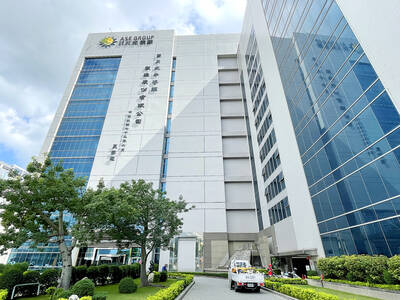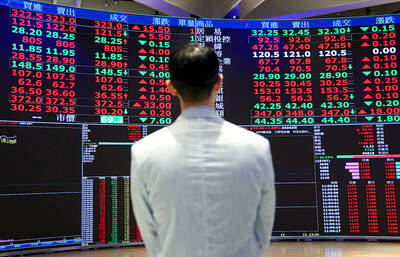The Taipei-based American Chamber of Commerce (AmCham) welcomes recent policy changes made by the Taiwanese government in the retail, tax and transport sectors, saying the decisions effectively resolved protracted issues covering a broad swathe of concerns.
“Getting solutions to three issues for three different committees was a nice way to end the summer,” AmCham president Andrea Wu (吳王小珍) was quoted as saying in last month’s issue of the AmCham monthly publication, Topics.
“Let’s hope we can maintain a similar momentum through the rest of the year,” she said.
Wu was referring to Taiwan’s recent liberalization of imports from China by removing tableware from the banned list, the clarification of the scope of “Taiwan-sourced income” for income tax purposes and allowing the use of electronic invoices to help expedite express cargo shipments.
The government’s prohibition on imports of made-in-China porcelain and chinaese tableware and kitchenware has been one of the priority items of the AmCham Retail Committee for the past several years.
The article said it was a particularly frustrating issue for the committee because the rationale for the ruling appeared to be “nebulous,” as although the local ceramics industry was not equipped to produce Western-style tableware in large quantities, the ceramics manufacturers association kept objecting to any relaxation of the ban on Chinese imports.
The Industrial Development Bureau of the Ministry of Economic Affairs decided in August to make the category as permissible for import.
Regarding “Taiwan-sourced income,” AmCham’s Tax Committee has long appealed to the Ministry of Finance to clear up confusion over the tax treatment of payments to overseas entities for services performed entirely offshore.
Last month, the ministry issued a ruling titled Guidelines for Determining Taiwan-sourced Income as Defined under Article 8 of the Income Tax Law (所得稅法), that provides just such clarification along the lines that the Chamber suggested, the article said.

EXPANSION: The investment came as ASE in July told investors it would accelerate capacity growth to mitigate supply issues, and would boost spending by 16 percent ASE Technology Holding Co (ASE, 日月光投控), the world’s biggest chip assembly and testing service provider, yesterday said it is investing NT$17.6 billion (US$578.6 million) to build a new advanced chip packaging facility in Kaohsiung to cope with fast-growing demand from artificial intelligence (AI), high-performance-computing (HPC) and automotive applications. The new fab, called K18B, is to commence operation in the first quarter of 2028, offering chip-on-wafer-on-substrate (CoWoS) chip packaging and final testing services, ASE said in a statement. The fab is to create 2,000 new jobs upon its completion, ASE said. A wide spectrum of system-level chip packaging technologies would be available at

Taiwan’s foreign exchange reserves hit a record high at the end of last month, surpassing the US$600 billion mark for the first time, the central bank said yesterday. Last month, the country’s foreign exchange reserves rose US$5.51 billion from a month earlier to reach US$602.94 billion due to an increase in returns from the central bank’s portfolio management, the movement of other foreign currencies in the portfolio against the US dollar and the bank’s efforts to smooth the volatility of the New Taiwan dollar. Department of Foreign Exchange Director-General Eugene Tsai (蔡炯民)said a rate cut cycle launched by the US Federal Reserve

HEAVYWEIGHT: The TAIEX ended up 382.67 points, with about 280 of those points contributed by TSMC shares alone, which rose 2.56 percent to close at NT$1,400 Shares in Taiwan broke records at the end of yesterday’s session after contract chipmaker Taiwan Semiconductor Manufacturing Co (TSMC, 台積電) hit a fresh closing-high amid enthusiasm toward artificial intelligence (AI) development, dealers said. The TAIEX ended up 382.67 points, or 1.45 percent, at the day’s high of 26,761.06. Turnover totaled NT$463.09 billion (US$15.22 billion). “The local main board has repeatedly hit new closing highs in the past few sessions as investors continued to embrace high hopes about AI applications, taking cues from a strong showing in shares of US-based AI chip designer Nvidia Corp,” Hua Nan Securities Co (華南永昌證券) analyst Kevin Su

Nvidia Corp’s major server production partner Hon Hai Precision Industry Co (鴻海精密) reported 10.99 percent year-on-year growth in quarterly sales, signaling healthy demand for artificial intelligence (AI) infrastructure. Revenue totaled NT$2.06 trillion (US$67.72 billion) in the last quarter, in line with analysts’ projections, a company statement said. On a quarterly basis, revenue was up 14.47 percent. Hon Hai’s businesses cover four primary product segments: cloud and networking, smart consumer electronics, computing, and components and other products. Last quarter, “cloud and networking products delivered strong growth, components and other products demonstrated significant growth, while smart consumer electronics and computing products slightly declined,” compared with the